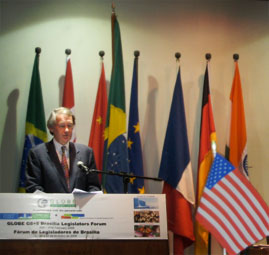
Chairman Markey at the Globe Forum in Brazil
Contact Us

Recent News
Live Copenhagen Coverage
Video available from Copenhagen includes the U.S. Delegation's press conference and network media coverage.
Click here to read more
November 17, 2009
International Climate Negotiations & US domestic Policy
The relationship between international climate negotiations and U.S. domestic policy
While the President is responsible for negotiating the next international climate agreement, he must work with Congress to ensure that U.S. domestic policies can meet our obligations.
Since assuming office in January 2009, President Obama has worked with Congress to build momentum for agreement in Copenhagen. In February the stimulus package dedicated $80 billion for clean energy technology research, development and deployment that will create jobs and help reduce emissions of heat-trapping gases. The House of Representatives furthered this commitment to combating climate change by passing the Waxman-Markey American Clean Energy and Security Act. The Waxman-Markey legislation sets a cap on U.S. carbon emissions, establishes a national efficiency and renewable energy target, and provides support to help the poorest countries deal with the impacts of global warming, invest in low-carbon development and halt deforestation. Addressing the United Nations in late September, President Obama characterized the House's passage of this historic bill as the most prominent signal of American resolve in addressing climate change. The U.S.'s chief climate negotiator, Todd Stern, echoed this sentiment in Congressional testimony, noting that the House passage of Waxman-Markey had afforded his negotiating team an unprecedented credibility.
The recent release of the Senate's draft climate bill underscores the United States commitment to addressing climate change. The U.S. negotiating position in Copenhagen will be further strengthened as the Senate process unfolds this fall.
In recent years, Congressional action has been critical to advancing the U.S. position in international negotiations.
As the 2007 UN climate negotiations were occurring in Bali, Congress was finalizing the Energy Independence and Security Act of 2007, which raised fuel economy standards for the first time in over thirty years and enacted other clean energy and efficiency policies. This law was a critical first step to reduce U.S. global warming pollution and signaled to the international community that America was returning to constructive engagement on international climate and energy policy.

